Related Research Articles
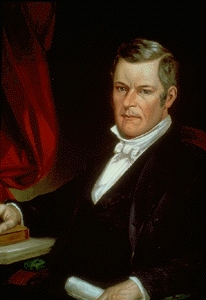
James Brown Ray was an Indiana politician and the only Indiana Senate president pro tempore to be elevated to governor of the state of Indiana. Ray served during a time when the state transitioned from personal politics to political parties, but never joined a party himself. Taking office one week before his 31st birthday, he became the state's youngest governor and served from 1825 to 1831, the longest period for an Indiana governor under the state constitution of 1816. During Ray's term as governor the state experienced a period of economic prosperity and a 45 percent population increase. He supported projects that encouraged the continued growth and development of the young state, most notably internal improvements, Native American removal, codification of Indiana's laws, improved county and local government, and expanded educational opportunities. Ray was known for his eccentricity and early promotion of a large-scale railroad system in the state. His support for new railroad construction and alleged involvement in several scandals caused him to lose popularity among voters. Ray's opponents who favored the creation of canals considered railroads to be an impractical, utopian idea. Following Ray's departure from political office, he continued to advocate for a statewide railroad system until his death in 1848.

John Ramsay McCulloch was a Scottish economist, author and editor, widely regarded as the leader of the Ricardian school of economists after the death of David Ricardo in 1823. He was appointed the first professor of political economy at University College London in 1828. He wrote extensively on economic policy, and was a pioneer in the collection, statistical analysis and publication of economic data.

William Gilmore Simms was an American writer and politician from the American South who was a "staunch defender" of slavery. A poet, novelist, and historian, his History of South Carolina served as the definitive textbook on state history for much of the 20th century. Literary scholars consider him a major force in antebellum Southern literature; in 1845 Edgar Allan Poe pronounced him the best novelist America had ever produced. Throughout much of his literary career he served as editor of several journals and newspapers. He also served in the South Carolina House of Representatives from 1844–1846.
The Porter-Gaud School is an independent coeducational college preparatory day school in Charleston, in the U.S. state of South Carolina. Porter-Gaud has an enrollment of about 1000 students, comprising an elementary school, middle school, and high school, and is located on the banks of the Ashley River. The school has historic ties to the Episcopal Church.

Robert Young Hayne was an American lawyer, planter and politician. He served in the United States Senate from 1823 to 1832, as Governor of South Carolina 1832–1834, and as Mayor of Charleston 1836–1837. As Senator and Governor, he was a leading figure in the Nullification Crisis and, along with John C. Calhoun and James Hamilton Jr., a vocal proponent of the doctrines of states' rights, compact theory, and nullification; his 1830 debate in the Senate with Daniel Webster is considered a defining episode in the constitutional crisis which precipitated the American Civil War.

Albert Gallatin Mackey was an American medical doctor and author. He is best known for his books and articles about freemasonry, particularly the Masonic Landmarks.

Chi Phi (ΧΦ) is considered by some as the oldest American men's college social fraternity that was established as the result of the merger of three separate organizations that were each known as Chi Phi. The earliest of these organizations was formed at Princeton University in 1824. Today, Chi Phi has over 47,000 living alumni members from over 100 active and inactive chapters and un-chartered associate chapters. Currently Chi Phi has about 50 active Chapters and 5 Associate Chapters.
The 1826 and 1827 United States House of Representatives elections were held at various dates in each state in 1826 and 1827 during John Quincy Adams's presidency.

The Charleston School of Law (CSOL) is a private for-profit law school in Charleston, South Carolina. It was established in 2003 and accredited by the American Bar Association (ABA) in August 2011. The school was founded upon a principle of promoting public service by its students and graduates; each student must perform at least 50 hours of public service before graduation. According to the school's 2018 ABA-required disclosures, 44.5% of the Class of 2017 obtained full-time, long-term, JD-required employment nine months after graduation.

The University of South Carolina School of Law, also known as South Carolina Law School, is a professional school within the University of South Carolina. The school of law was founded in 1867, and remains the only public and non-profit law school in the state of South Carolina. The school has been accredited by the American Bar Association since 1925 and has been a member of the Association of American Law Schools since 1924.
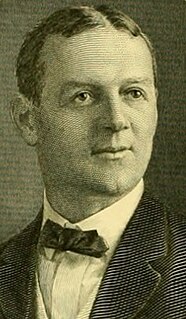
George Swinton Legaré was an American attorney and politician from South Carolina. He was best known for his service in the United States House of Representatives from 1903 until his death.

William John Grayson was a U.S. Representative from South Carolina. He was also a poet.
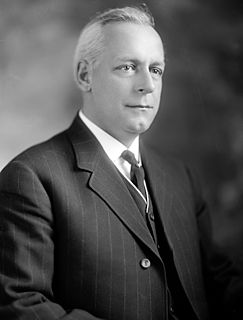
Richard Smith Whaley was a United States representative from South Carolina and Chief Justice of the Court of Claims.
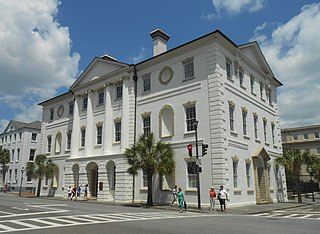
Charleston Library Society, founded in 1748, is a subscription library in Charleston, South Carolina.

James Matthews Legaré was an American poet and inventor.

William Nichols, Sr. was an English-born architect who emigrated to the United States and became most famous for his early Neoclassical-style buildings in the American South. He is best known for designing early statehouses for North Carolina, Alabama and Mississippi.

Basil Manly Sr. (1798–1868) was an Alabama plantation owner, Baptist preacher, slave owner, pro-slavery lobbyist, and official chaplain to the Confederate States of America.

Joseph Johnson (1776–1862) was the twenty-seventh mayor of Charleston, South Carolina, serving two terms from 1825 to 1827. He was re-elected to his second term on September 4, 1826. He also was the president of the Branch Bank of the United States from 1818 until its close and authored a work titled "Traditions of South Carolina." Johnson died on October 6, 1862, in Pineville, South Carolina and is buried at St. Philips Episcopal Church in Charleston. In his youth he operated the leading drug store in Charleston.
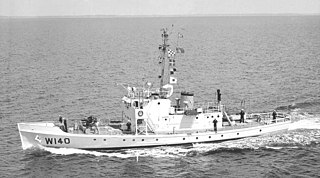
USCGC Legare (WSC-144) was a United States Coast Guard cutter that served in the Coast Guard for almost forty-one years.
References
- ↑ "Charleston Had First Southern Law School". Charleston News & Courier. May 15, 1955. p. 11-C. Retrieved Nov 4, 2012.
- ↑ "Communication". City Gazette and Commercial. June 12, 1826. p. 2.
- ↑ Petition to the House of Rep. of the State of S.C. (1825) (located in the South Carolina Historical Commission).
- ↑ "Statutes at Large of South Carolina". Act. 2379. 1840. Retrieved Nov 4, 2012.
- ↑ Charleston Courier, February 8, 1826.
- ↑ Merrill G. Christophersen, Earliest Law School in the South, 7 S.C. Law Quarterly 375, 377-78 (1955).
- ↑ Merrill G. Christophersen, Earliest Law School in the South, 7 S.C. Law Quarterly 375, 378 (1955).
- ↑ Merrill G. Christophersen, Earliest Law School in the South, 7 S.C. Law Quarterly 375, 378 n.10 (1955).